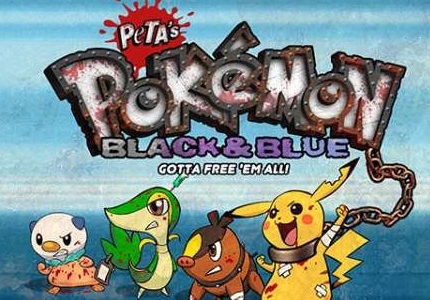You are here
Flash Games and Visual Rhetoric
Primary tabs

Though the game itself is available on PETA's website, this still-image is pulled from a Forbes article: http://blogs-images.forbes.com/erikkain/files/2012/10/Pokemon-PETA-600x3...
This assignment pushes students to recognize the layers of rhetoric and propaganda embedded in something as visual and auditory as a flash game. By playing and analyzing PETA's Pokemon Black and Blue, and comparing it to the original source, they will hopefully gain a more robust understanding of the relationship between classical rhetoric and an increasingly digitized world.
This is an activity meant to follow a lesson on rhetorical fallacies and/or methods of argumentation that aren't necessarily fallacious. It will reinforce these terms and definitions while providing a vivid, visual example of them in action.
It also serves as the basis for a later presentation project in which students will design their own flash games in groups using http://www.sploder.com (as a last-day-of-class assignment).
Projector
Internet
Computer/media console for the instructor
Optional: computer for every student
Though this could be a shorter assignment - as short as showing a commercial advertisement on the projector and asking students to discuss it in groups - I believe it would be a more enriching process if at least half of a one-and-a-half-hour session were devoted to it.
This assignment fits best after a comprehensive lecture on logos, ethos, and pathos as well as rhetorical fallacies in written texts. The instructor has two options: he/she can use the overhead projector to show the contents of his/her screen or students can be paired into groups of three and sent to their own desktops.
Though it is up to the instructor what game will be the subject of analysis, I have a few suggestions: PETA's parody of Pokemon Black and Pokemon White (http://features.peta.org/pokemon-black-and-white-parody/) or a Flash game critique of McDonald's and the fastfood industry in general (http://www.mcvideogame.com/index-eng.html). PETA actually has quite a few different parodies on the linked website.
Students are asked to play through the game (or watch the instructor go through it) and note what types of strategies the creators use to present the controversy, persuade the audience, and/or attack the opponent. They must find at least three fallacies and give detailed examples of how these were used, and under which modes of persuasion they might fall under (logo, pathos, or ethos). To bring Units I and II of RHE 306 together, I ask the students to also "map" this situation: who are the stakeholders? Who or what do these respond to? What are the potential biases?
Students must be specific and stay as close to the language of the course as possible when analyzing the game. At the end of this assignment, students will present their findings to each other.
(If the instructor is concerned about participation, students could take turns playing the game in their groups. One student plays, two take notes, switch, repeat.)
Play through the game beforehand and make a note of the images and events that are most important to the course content.
If particularly motivated, the instructor could make a handout of the list of fallacies students should be applying to the game.
Play the game with group members, dividing work/play evenly.
Take notes on as many devices and strategies as possible, with references to specific moments in the game.
Be ready to present findings in front of classmates.
The presentation is proof of participation though the instructor can do walkarounds during the activity to check that it isn't one student doing all of the work.
Given the increasing popularity and importance of electronic sports (Esports), I find it unsurprising that my students seem particularly receptive to videos and other digital media formats, and are often able to express rhetoric-related ideas more clearly in these contexts. Many of my students have also chosen to do their controversies over some form of media. It can be time consuming though and there might be bumps with plugin malfunctions; however, putting students into groups lessens the amount of slower starts.
RHE 306 is an introductory course in writing and argumentation.
-

- Log in to post comments

